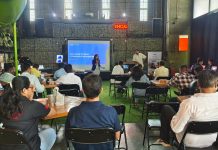D2L, a leading learning management system (LMS) platform, successfully concluded its academic roundtable on “Next-Gen Learning: Personalisation, Technology and Beyond”. The roundtable successfully brought together key industry professionals, including educators and administrators, to discuss actionable strategies for enhancing personalized learning and integrating hybrid education models. The session put an emphasis on fostering collaboration and empowering every student to unlock their potential. It also focused on several key areas related to the increasing importance of technology in higher education, with a particular focus on online learning and blended models.
The event began with a discussion led by Stewart Watts, senior vice president, EMEA & APAC sales, D2L, around technology and its role in personalized learning as well as current priorities for universities. Elaborating further on this, he said, “Globally, universities are facing a crucial moment with regards to higher education. The skills gap—specifically in digital literacy—has driven the need for more adaptable and reliable educational models. Educational institutions are not only looking forward to diversifying their revenue streams but also widening the overall access to education by offering the flexibility that the learners of today demand. The shift towards online and blended learning, post the COVID-19 pandemic, has presented both challenges and opportunities. The academic burnout due to the pandemic made shifting towards online pedagogies a difficult task. At the same time, it made online and blended learning a global trend and put students at the center of learning.
While technology can never replace the human element, it does promote accessibility to education. At D2L, we are a pedagogy-based organization, which sets us apart from other LMS platforms in the market. While competitors try to build technology and fit education into it, we believe in placing the learner at the center.”
This discussion was furthered by Nick Hutton, senior director, APAC, D2L, who highlighted the market maturity for online education globally and other technology-driven trends in education. He said “Terms such as online, hybrid and hi-flex learning often cause confusion among the general public, but this is not the core issue. A completely online model of teaching, while effective in certain contexts, is not always beneficial. While the online education market in North America has evolved over many years, India is growing rapidly in the educational technology space. A significant challenge for us has been in helping educational institutions understand the value of an LMS and particularly how it can be instrumental in enhancing
face-to-face sessions and improving overall teaching outcomes. At D2L, our approach is mainly industry-focused—we start with pedagogy rather than technology. As educational technology continues to evolve, particularly with the rise of short courses and micro-credentials, the role of LMSs to support teachers and educators is becoming increasingly valuable.”
This was followed by a roundtable discussion focused on the evolution of educational technology across the pre-COVID and post-COVID periods. The panel members included distinguished members of the Pune academic community, including Dr. Ramachandra Pujeri, pro VC, MIT ADT, Dr. Vivek Saoji, VC, BVP and Dr. BB Ahuja, VC, JSPM University among others. The panelists collectively acknowledged the persistence of online learning models from the years of the pandemic and focused on the need to adapt to new teaching methods to enhance educational experiences and train the professionals of the next generation. There was also a discussion on the challenges that remain, such as student engagement, digital divides, and the need for faculty to become more technologically adept. The discussion came to a conclusion by highlighting the need to balance between traditional and online methods of learning and leveraging platforms such as D2L Brightspace to enhance educational outcomes and meet teaching goals.





